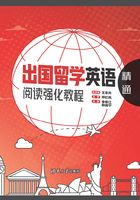
Unit 2 Mysteries of the World
Section I
Focus on Critical Thinking and Critical Reading (2)
Benefits of Critical Thinking
A good critical thinker knows how to separate facts from opinions, how to examine an issue from all sides, how to make rational inferences and how to withhold personal judgment or biases.
A Clear Head
Rational critical thinkers are generally the voices of reason in times of mass hysteria or panic. As Franklin D. Roosevelt said, "We have nothing to fear but fear itself." The critical thinker usually has the comprehensive skills to consider all possible options and solve a problem.
Smarter, Quicker
The critical thinker remains calm and knows when he is right. Critical thinkers are less likely to fall for scams or tricks because they approach everything with a healthy amount of skepticism. Those who lack critical thinking skills often assume that everything they hear is true, regardless of the source.
Time-saving
Critical thinkers consider all options before they act. If time is an important factor, they consider the fastest method of achieving a goal. They may even discover a shortcut. Critical thinkers embody the phrase "work smarter, not harder". They are masters of efficiency.
Decision Making/Employment
Many of the highest paying jobs require critical thinking skills, such as generating effective ideas and making important decisions. Job interviewers often ask applicants questions that test their ability to think critically. Critical thinking skills may also be a deciding factor when an employee seeks a promotion.
Perspective
A critical thinker has the self-awareness to know the difference between a rational thought based on careful consideration and an emotional response based on personal biases. Emotion is the enemy of reason. By understanding your own perspective, you can also consider the perspective of others and come to a conclusion based on facts, not feelings.
Specifically, critical thinking may help us in the following fields:
Academic Performance
1) Understand the arguments and beliefs of others.
2) Critically evaluate those arguments and beliefs.
3) Develop and defend one's own well-supported arguments and beliefs.
Workplace
1) Reflect and get a deeper understanding of our own and others' decisions.
2) Encourage open-mindedness to change.
3) Aid us in being more analytical in solving problems.
Daily Life
1) Avoid making foolish personal decisions.
2) Promote an informed and concerned citizenry capable of making good decisions on important social, political and economic issues.
3) Aid in the development of autonomous thinkers capable of examining their assumptions, dogmas, and prejudices.
Someone with critical thinking skills is able to do the following: understand the logical connections between ideas; identify, construct and evaluate arguments; detect inconsistencies and common mistakes in reasoning; solve problems systematically; identify the relevance and importance of ideas and to reflect on the justification of one's own beliefs and values.